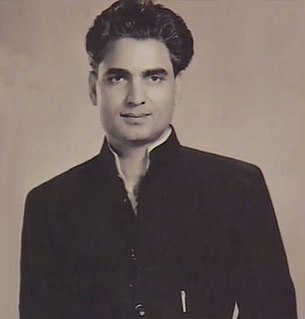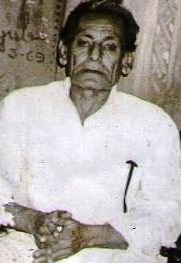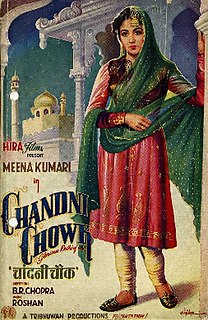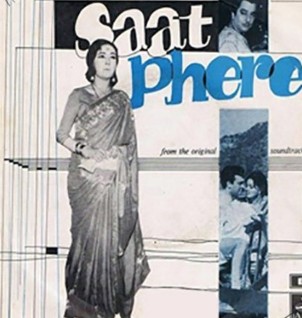A shayar is a poet who composes sher in Urdu, Hindi, or Persian. Commonly, a shayar is someone who writes ghazals, nazms using the Urdu language.

Meena Kumari was an Indian actress and poet, who worked in Hindi films. Popularly known as The Tragedy Queen, she was active between 1939 and 1972. Kumari was described by critics as a "historically incomparable" actress of Hindi cinema. In a career spanning 33 years, she starred in about 92 films such as Sahib Bibi Aur Ghulam, Pakeezah, Mere Apne, Aarti, Baiju Bawra, Parineeta, Dil Apna Aur Preet Parai, Foot Path, Dil Ek Mandir and Kaajal.

Pakeezah is a 1972 Indian Hindustani-language musical romantic drama film that was written, directed and produced by Kamal Amrohi. It features Ashok Kumar, Meena Kumari and Raaj Kumar as the lead actors, with Veena, Nadira and D. K. Sapru in the supporting roles. The story revolves on Sahibjaan (Kumari), a Lucknow-based tawaif. In her travel by train, she gets a note from a stranger praising her beauty when she was sleeping. Afterward, she—evacuating from her broken boat—take shelter in a tent and finds out that its owner, the forest ranger Salim, was the one who wrote the letter. Rest of the film follows the two's plan to get married and conflicts caused by her professional background.

Baiju Bawra is a 1952 Hindi musical romantic drama film directed by Vijay Bhatt. Produced by Prakash Pictures, with story by Ramchandra Thakur and dialogues by Zia Sarhadi, Baiju Bawra was a musical "megahit" which had a mighty run of 100 weeks in the theatres. Bhatt's decision to make a film based on classical music was met with scepticism by the Indian film industry due to its "lack of mass appeal", but the film and music turned out be an "overwhelming success". The film's music director was Naushad, who had become popular giving folk-based music in films such as Rattan, Anmol Ghadi, Shahjehan (1946) and Deedar (1951). With Bhatt's Baiju Bawra, Naushad introduced a classical component in Hindi film songs. The soundtrack was based on classical ragas such as Puriya Dhanashree, Todi, Malkauns, Darbari and Desi. The lyricist was Shakeel Badayuni, a Naushad discovery. For Baiju Bawra, he had to forgo Urdu, and write lyrics in pure Hindi, with songs such as the bhajan "Man Tadpat Hari Darshan Ko Aaj", becoming popular.

Syed Amir Haider Kamal Naqvi, popularly known as Kamal Amrohi, was an Indian film director and screenwriter. He was also an Urdu and Hindi poet.

Raziya Sultan, also known as Razia Sultan, is 1983 Indian period biographical film, written and directed by Kamal Amrohi, and starring Hema Malini, Parveen Babi and Dharmendra in lead roles.

Kohinoor is a 1960 Bollywood action adventure film produced by Dr V. N. Sinha and directed by S. U. Sunny. The film stars Dilip Kumar, Meena Kumari, Leela Chitnis and Kumkum. The film's music is by Naushad. A box-office success, it was the third-highest grossing Indian film of 1960.

Ghulam Mohammed was an Indian film score composer, who is most remembered for his work in Hindi musical-hit films like Pardes (1950), Mirza Ghalib (1954), Shama (1961) and Pakeezah (1972).

Kaif Bhopali was an Indian Urdu poet and lyricist. He was a poet in the Urdu mushaira circles, and is known as the writer of songs like Chalo Dildar Chalo, sung by Mohd. Rafi in Kamal Amrohi's 1972 classic, Pakeezah.
The Muslim social is a film genre in Hindi cinema that portrays and critiques Islamic culture in India. It flourished in the 1950s and 1960s and lasted till the early 1980s. Muslim socials are divided into two categories: "classic Muslim socials" that explore nawabi culture and focus on upper class or elite Muslim families, and "new wave Muslim socials" that portray middle class Muslim families who experience economic problems, discrimination and communal violence. Muslim socials often include ghazals, qawwalis, Urdu poetry and expressions, and musical forms commonly associated with Islamic culture. However, lately the label has also been criticized for cultural ghettoization of minority cinema. Director M.S. Sathyu who made Garam Hava (1973), called it "a skewed way to look at cinema. When there is no Hindu social or Christian social, how can there be a Muslim social".
The 20th Filmfare Awards were held in 1973, awarding the films made in 1972.
Shahjehan is a 1946 Indian Hindi language film. The film was directed by Abdul Rashid Kardar and written by Kamal Amrohi. It starred K. L. Saigal, Ragini, Kanwar, Nasreen and P. Jairaj. The music was composed by Naushad with Majrooh Sultanpuri and Khumar Barabankavi making his debut as a lyricist in this film. The story was a fictionalized account of an episode during the reign of Emperor Shahjehan. It was the second highest grossing Indian film of 1946.

Chandni Chowk is a 1954 classic Muslim social drama film directed by B. R. Chopra. The music was composed by Roshan with lyrics written by Majrooh Sultanpuri, Saifuddin Saif, Kamil Rashid, Shailendra and Raja Mehdi Ali Khan. Story was by D. P. Berry with screenplay by I. S. Johar and dialogue written by Kamil Rashid. Produced by Prince Hira Sinh of Baria and Goverdhandas Aggarwal under the banner of Hira Films. The director of photography was Keki Mistry. The film starred Meena Kumari, Shekhar, Kumar, Jeevan, Smriti Biswas and Achala Sachdev. The main hero Shekhar was one of the less appreciated lead actors of the 1940s and 1950s but has been cited as a "master of realistic portrayals" usually cast in "mid-budget films".

Pinjre Ke Panchhi is a 1966 Indian Hindi-language film starring Meena Kumari, Balraj Sahni and Mehmood in lead roles. The film marks the directorial debut of ace music director Salil Chowdhury who also gave its music. It was a commercial failure at the box office.

Saat Phere is a 1970 black and white Indian Hindi-language film starring Meena Kumari, Pradeep Kumar and Shyama in lead roles. The film was directed by Sundar Dhar.













